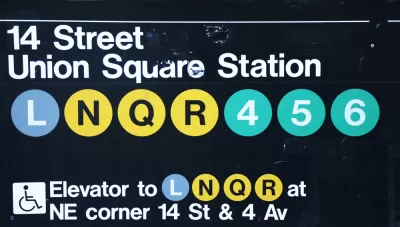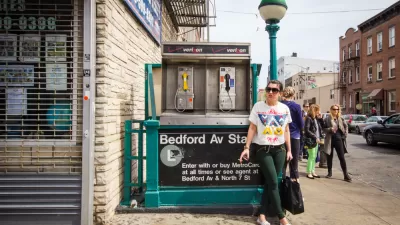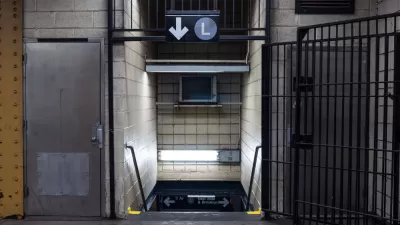The New York MTA has chosen the "remove-the-band-aid-quickly" strategy for its plans to repair the L Train line from Brooklyn to Manhattan.

Emma G. Fitzsimmons reports: "The Metropolitan Transportation Authority plans to close a tunnel that carries the L train, one of New York City’s most crowded subway lines, creating what officials acknowledge will be among the largest disruptions in the transit system’s history."
The threat of the closures has been lingering for a long time, though its doubtful the news about the closures brings any relief. In May, the New York Daily News described the whole situation when officials were considering one of two options for the closures. The announcement on Monday effectively ends the debate, and chooses the complete closure alternative over an option that would have allowed the operation of limited service over a three-year period.
"After considering two proposals for shutting down the L tunnel, the authority decided on the 18-month closing instead of a partial three-year shutdown that would have allowed some trains to continue running," explains Fitzsimmons.
As for details of exactly what parts of the L Train will be effected, Fitzsimmons adds this: "L trains will continue to operate in Brooklyn between the Williamsburg and Canarsie neighborhoods, but will not run between the Eighth Avenue stop in Manhattan and the Bedford Avenue station in Brooklyn. All five L train stops in Manhattan will close, along with the tunnel. About 225,000 riders now take the L train across the East River each day."
FULL STORY: L Train Will Shut Down Between Manhattan and Brooklyn in ’19 for 18 Months

Planetizen Federal Action Tracker
A weekly monitor of how Trump’s orders and actions are impacting planners and planning in America.

Maui's Vacation Rental Debate Turns Ugly
Verbal attacks, misinformation campaigns and fistfights plague a high-stakes debate to convert thousands of vacation rentals into long-term housing.

Restaurant Patios Were a Pandemic Win — Why Were They so Hard to Keep?
Social distancing requirements and changes in travel patterns prompted cities to pilot new uses for street and sidewalk space. Then it got complicated.

In California Battle of Housing vs. Environment, Housing Just Won
A new state law significantly limits the power of CEQA, an environmental review law that served as a powerful tool for blocking new development.

Boulder Eliminates Parking Minimums Citywide
Officials estimate the cost of building a single underground parking space at up to $100,000.

Orange County, Florida Adopts Largest US “Sprawl Repair” Code
The ‘Orange Code’ seeks to rectify decades of sprawl-inducing, car-oriented development.
Urban Design for Planners 1: Software Tools
This six-course series explores essential urban design concepts using open source software and equips planners with the tools they need to participate fully in the urban design process.
Planning for Universal Design
Learn the tools for implementing Universal Design in planning regulations.
Heyer Gruel & Associates PA
JM Goldson LLC
Custer County Colorado
City of Camden Redevelopment Agency
City of Astoria
Transportation Research & Education Center (TREC) at Portland State University
Jefferson Parish Government
Camden Redevelopment Agency
City of Claremont





























